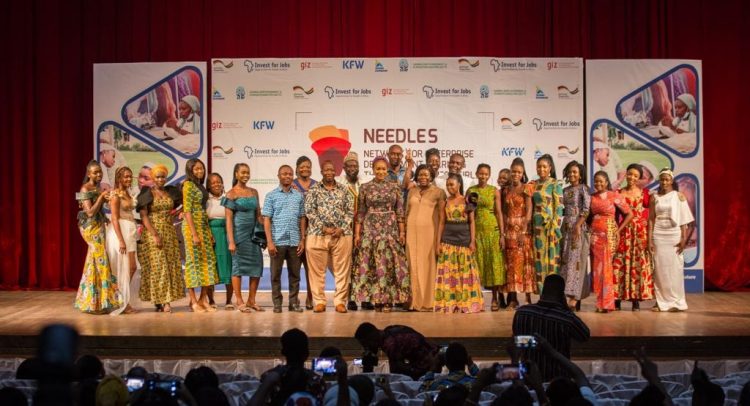Mrs. Samira Bawumia (middle) and dignitaries with the graduates.
WIFE OF the Vice President, Samira Bawumia, has indicated that the full inclusion and integration of women in the economic space of Ghana is non-negotiable.
According to her, when women exercise greater control over economic resources, they empower otherwomen in the informal sectors to expand their financial decision making power.
“Empowering young women to become not only wage earners but also job-creators is imperative for achieving the 2030 Agenda, and for eradicating poverty,” she said.
She said it was important that things are done differently to build the capacity of women as a means of empowering them to seize employment opportunities and take control of their lives.
“An economically empowered woman is an invaluable asset to herself, her community, and her nation,” she added.
Mrs. Bawumia was speaking at the graduation ceremony of the ‘Network for Enterprise Development Learning Through Sewing (Needles) For Girls (N4G) project by the Samira Empowerment and Humanitarian Projects (SEHP), and the Ghana Export-Import Bank (GEXIM BANK), in cooperation with the Special Initiative on Training and Job Creation of the German Federal Ministry for Economic Cooperation and Development (BMZ).
The project, which started 14 months ago, to address the lack of qualified, well-trained workers in Ghana’s fashion and textile industries, provided 654 females with employable skills for the fashion industry.
It also equipped the trainees,drawn from the Northern, Ashanti and Greater Accra regions, with vocational skills to find formal employment in existing fashion houses and support the setup of micro, small and medium-scaled businesses (MSMEs) within the fashion industry. Mrs. Bawumia urged the graduates to maximise the opportunity given and create new ones. “You may encounter setbacks, but you must not allow them to define you or keep you from trying,” she said.
Team Lead Invest for Jobs, (GIZ-Ghana), John Duti, said the graduates represents 77 per cent of the total number of girls selected for the training.
“Out of this overall figure,151 girls completed the training in Tamale; 153 in Kumasi; and 350 girls in Accra. It is interesting to note that 83 percent of the graduates across the three locations are already employed directly by some of the fashion houses who trained them,” he said.
Mr. Duti indicated that the remaining 17 per cent have been linked to other fashion houses for jobs and internships through the wider networks of these training institutions; and others are now self-employed, operating as start-ups.
The girls were trained by PISTIS Gh, Africa Fashion Incubator (AFI Ghana), Sustainability Lab, and Strokes and Lines.
BY Jamila Akweley Okertchiri


